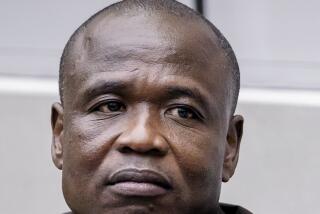Congolese ex-warlord convicted of using children as soldiers
- Share via
Reporting from Johannesburg, South Africa — The International Criminal Court in The Hague on Wednesday found former Congolese warlord Thomas Lubanga guilty of using children as soldiers, the first verdict in the panel’s 10-year history. He could face life imprisonment.
After a three-year trial, the court convicted Lubanga of recruiting boys and girls younger than 15 as soldiers during a civil war in the Democratic Republic of Congo in 2002 and 2003. Although his militia was accused of massacres, rapes, torture and ethnic killings by human rights activists and witnesses, the court charged him only with the recruitment and use of children to fight.
Amnesty International expressed disappointment that the court failed to prosecute other crimes that Lubanga was alleged to have committed and called on the ICC to widen its future prosecutions. It also called on the court to ensure trials proceeded more swiftly.
The verdict was seen as a major breakthrough in forcing warlords and politicians to be held accountable for atrocities and crimes against humanity, sending a message that international justice eventually would catch up with them.
The ICC was established in 2002 to prosecute cases of genocide, crimes against humanity and war crimes in instances where local courts are unable to do so, or when local authorities are unwilling to act.
Three victims testified during Lubanga’s trial, while others participated indirectly, such as by making submissions to the court. The evidence said girls forcibly recruited by the warlord were used as sex slaves, and videos aired in court showed Lubanga surrounded by child combatants.
The verdict sent a clear message that recruiting and using children as combatants or sex slaves is a crime against humanity, including in cases where children joined militias voluntarily. Tens of thousands of children continue to be used in wars across the continent, according to human rights agencies.
Human Rights Watch said the verdict was a first step to bringing justice to those children.
“The verdict against Lubanga is a victory for the thousands of children forced to fight in Congo’s brutal wars,” said Geraldine Mattioli-Zeltner, justice advocacy director at the organization, in a statement. “Military commanders in Congo and elsewhere should take notice of the ICC’s powerful message: Using children as a weapon of war is a serious crime that can lead them to the dock.”
Human Rights Watch said the verdict indicated the need to arrest Bosco Ntaganda, who has been indicted along with Lubanga but not apprehended. Ntaganda is a Congolese army general based in the eastern part of the country. The organization said it was important that the verdict be made known to Congolese, particularly in the region where the crimes took place.
Amnesty International said recruitment of child soldiers in Congo continued.
Lubanga was the first person to be arrested on an ICC warrant. The defendant claimed he had discouraged the use of children in combat, an assertion rejected by the court. He has 30 days to appeal his conviction. The court will determine reparations for victims in coming weeks.
Other African leaders or warlords indicted by the court include Joseph Kony of the Lord’s Resistance Army, whose activities in Uganda were highlighted in a video watched by about 70 million people last week. (He is believed to be hiding in the Central African Republic.)
The video went viral after celebrities tweeted about it. Underscoring the increasing role celebrities play in drawing mass attention to rights abuses in Africa, actress Angelina Jolie was present in the public gallery of the ICC for the verdict Wednesday, later praising the court’s decision.
Meanwhile Hollywood star George Clooney testified before Congress on Wednesday, accusing Sudan’s government of a “campaign of murder and fear and displacement and starvation” against the people of the Nuba Mountains in the South Kordofan region, where the Sudanese air force has carried out bomb attacks in recent months.
President Omar Hassan Ahmed Bashir of Sudan was the first head of state to be indicted in office by the international court for crimes against humanity. He has evaded capture by limiting his travel to friendly countries. And the Ivory Coast’s ex-president, Laurent Gbagbo, became the first former head of state to appear before the court after being indicted for crimes against humanity after his ouster last year.
Four leading Kenyan politicians were indicted by the court this year for their alleged role in inciting violence after disputed 2007 elections in their nation.
More to Read
Sign up for Essential California
The most important California stories and recommendations in your inbox every morning.
You may occasionally receive promotional content from the Los Angeles Times.










